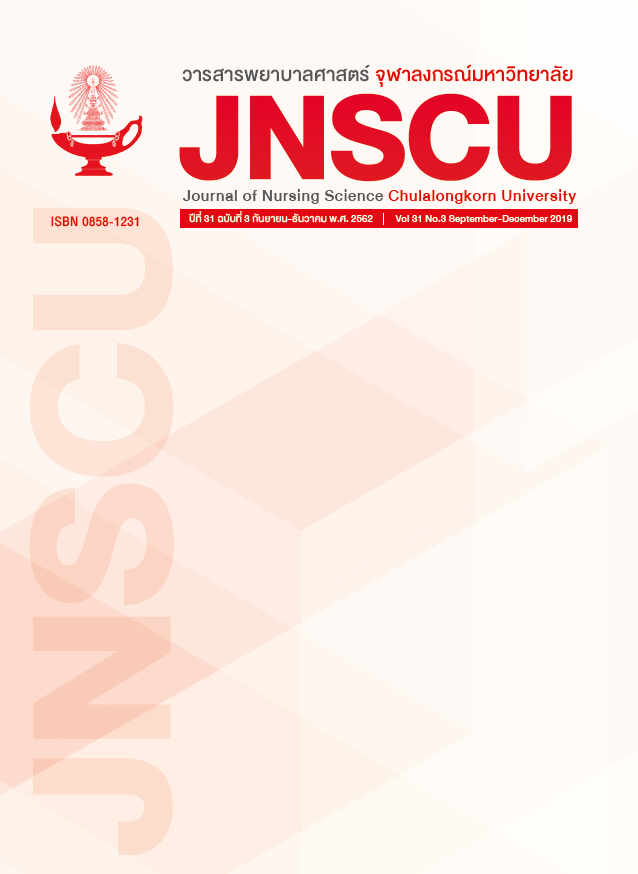การพัฒนาความสามารถของผู้ดูแลเพื่อการดูแลผู้ป่วยโรคหลอดเลือดสมอง
คำสำคัญ:
ความสามารถในการดูแล/ผู้ป่วยโรคหลอดเลือดสมอง/ผู้ดูแลบทคัดย่อ
วัตถุประสงค์: เพื่อศึกษาการพัฒนาความสามารถของผู้ดูแล ในการดูแลผู้ป่วยโรคหลอดเลือดสมอง
รูปแบบการวิจัย: การวิจัยกึ่งทดลองแบบ One Group Pretest - Posttest Design
วิธีดำเนินการวิจัย: กลุ่มตัวอย่างคือผู้ดูแลผู้ป่วยโรคหลอดเลือดสมองจำนวน 38 คน เครื่องมือวิจัยประกอบด้วย: 1) แบบสอบถามข้อมูลทั่วไปของผู้ดูแล และ 2) แบบประเมินความสามารถในการดูแลผู้ป่วยโรคหลอดเลือดสมอง กลุ่มตัวอย่างได้รับความรู้และการฝึกทักษะการดูแลผู้ป่วยโรคหลอดเลือดสมองก่อนผู้ป่วยถูกจำหน่ายกลับบ้านเป็นเวลา 4 วัน วิเคราะห์ความแตกต่างของคะแนนเฉลี่ยความสามารถในการดูแลผู้ป่วยโรคหลอดเลือดสมองของผู้ดูแลในกลุ่มตัวอย่างกลุ่มเดียววัดก่อนและหลังการดำเนินงานวิจัย โดยใช้สถิติ paired samples t – test ข้อมูลจากการสัมภาษณ์ผู้ดูแลผู้ป่วยเกี่ยวกับประสบการณ์การดูแลผู้ป่วยนำมาวิเคราะห์เชิงเนื้อหา
ผลการวิจัย: คะแนนเฉลี่ยความสามารถในการดูแลผู้ป่วยโรคหลอดเลือดสมองของผู้ดูแลสูงกว่าก่อนเข้าร่วมการวิจัยอย่างมีนัยสำคัญทางสถิติที่ระดับ p<.001
ข้อสรุป: ควรเตรียมความพร้อมผู้ดูแลโดยการแนะนำให้ความรู้และให้ทดลองปฏิบัติกับผู้ป่วยจริงก่อนจำหน่ายกลับบ้านมีส่วนช่วยให้ผู้ดูแลเกิดความมั่นใจและสามารถทำกิจกรรมการดูแลผู้ป่วยได้อย่างมีประสิทธิภาพ
เอกสารอ้างอิง
2. Nilanont Y, Nidhinandana S, Suwanwela NC, Hanchaiphiboolkul S, Pimpak T, Tatsanavivat P, et al. Quality of acute ischemic stroke care in Thailand: a prospective multicenter
countrywide cohort study. J Stroke CerebrovascDis. 2014; 23(2):213-9.
3. Jorgensen HS, Nakayama H, Raaschou HO, Larsen JV, Steier M, Olsen TS. Outcome and time course of recovery in stroke. Part II: time course of recovery. The Copenhagen Stroke Study. Arch Phys Med Rehabil. 1995; 76:406-12.
4. Langhammer B, Stanghelle JK, Lindmark B. An evaluation of two different exercise regimens during the first year following stroke: a randomized controlled trial. Physiother Theory Pract. 2009; 25:55–68.
5. Dean CM, Richard CL, Malouin F. Task-related circuit training improves performance of locomotor tasks in chronic stroke: a randomized, controlled pilot trial. Arch Phys Med Rehabil. 2000; 81:409-17.
6. Rimmer JH, Riley B, Creviston T, Nicola T. Exercise training in a predominantly African-American group of stroke survivors. Med Sci Sports Exerc. 2000; 32:1990-6.
7. Eng JJ, Chu KS, Kim CM, Dawson AS, Carswell A, Hepburn KE. A community-based group exercise program for persons with chronic stroke. Med Sci Sports Exerc. 2003; 35:1271-8.
8. Purba WS, Amatayakul A, Wattanakul B. The relationship between depression, social support and quality of life of stroke survivors in Bukittinggi, Indonesia. J Health Res. 2015; 29(Suppl.1): S109-16. DOI: 10.14456/jhr.2015.57
9. Billinger SA, Arena R, Bernhardt J, Eng JJ, Franklin BA, Johnson CM, et al. Physical activity and exercise recommendations for stroke survivors.Stroke. 2014; 45(8):2532–2553.
10. HRH Princess Maha Chakri Sirindhorn Medical Center. Annual report 2018.
11. Donabedian A. An introduction to quality assurance in health care. New York: Oxford University Press; 2003.
12. Monruedee C, Phenchan L. The development of nursing care to promote family participation in caring of patients with cardiovascular disease at Medical Department, Nongkhai Hospital. Independent study (M.N.S) Khon Kaen: Khon Kaen University.; 2009. (in Thai).
13. Wasana M, Supreeda M, Yupapin S, Sirirat L. Impact of Transitional Care Programme and Family Caregivers on Stroke Patients’ Routine Activity Performance, Complications, and Satisfaction. Thai Journal of Nursing Council. 2016; 31(1): 95-110.
14. Piyanuch P, Kittipoom P, Petchsavai L, Somsak T, Chiraporn W, Witun C, et al. Care Improvement for Patients with Stroke Through Community Participation. Songklanagarind Journal of Nursing. 2015; 35 (2): 93-111
15. Somkid P, JinJuta R, Somkid T, Wirawan C. Effect of Empowerment Programs on Stroke Patients’ Care Ability of Caregivers. Journal of Nursing Division. 2009; 36(3); 47-57.
16. Gurjar NR. Effectiveness of educational program on knowledge and competence of home care of stroke patients among care givers. Int J Health Sci Res. 2019; 9(5):260-265.
17. Tubtimpradit J. Effect of caregiver preparation on activities of daily living for stroke patients at Lampang Hospital. (M.N.S thesis) Chiang Mai: Chiang Mai University.; 2004. (in Thai).
18. Nishio D, Takahashi H, Hayashi T, Hirano Y, Minakawa T, Kigawa H. Factors influencing the burden on caregivers of stroke patients with hemiplegia living at home. Int J Phys Med Rehabil. [serial on the Internet]. 2015. [cited 2019 June 14]; 3(3): [about 5 p.]. Available from: https://dx.doi.org/10.4172/2329-9096.1000279
เผยแพร่แล้ว
ฉบับ
ประเภทบทความ
สัญญาอนุญาต
ลิขสิทธิ์ (c) 2020 วารสารพยาบาลศาสตร์ จุฬาลงกรณ์มหาวิทยาลัย

อนุญาตภายใต้เงื่อนไข Creative Commons Attribution-NonCommercial-NoDerivatives 4.0 International License.
##default.contextSettings.thaijo.licenseTerms##


